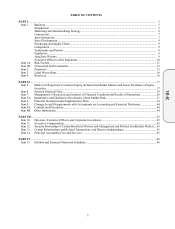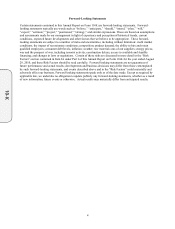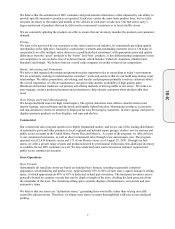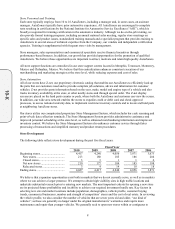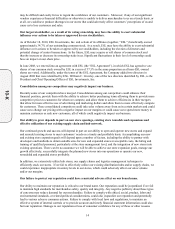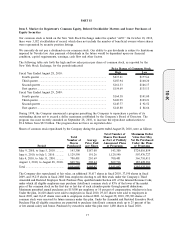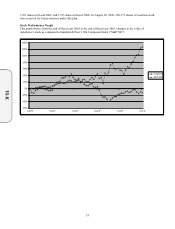AutoZone 2010 Annual Report Download - page 103
Download and view the complete annual report
Please find page 103 of the 2010 AutoZone annual report below. You can navigate through the pages in the report by either clicking on the pages listed below, or by using the keyword search tool below to find specific information within the annual report.
merchandise quality, selection and availability, price, product warranty, distribution locations, and the strength of
our AutoZone brand name, trademarks and service marks, some automotive aftermarket jobbers have been in
business for substantially longer periods of time than we have, have developed long-term customer relationships
and have large available inventories. If we are unable to profitably develop new commercial customers, our sales
growth may be limited.
Deterioration in the global credit markets, changes in our credit ratings and macroeconomic factors could
adversely affect our financial condition and results of operations.
Our short-term and long-term debt is rated investment grade by the major rating agencies. These investment-grade
credit ratings have historically allowed us to take advantage of lower interest rates and other favorable terms on
our short-term credit lines, in our senior debt offerings and in the commercial paper markets. To maintain our
investment-grade ratings, we are required to meet certain financial performance ratios. An increase in our debt
and/or a decline in our earnings could result in downgrades in our credit ratings. A downgrade in our credit ratings
could result in an increase in interest rates and more restrictive terms on certain of our senior debt and our
commercial paper, could limit our access to public debt markets, could limit the institutions willing to provide
credit facilities to us and could significantly increase the interest rates on such facilities from current levels.
Moreover, significant deterioration in the financial condition of large financial institutions in calendar years 2008
and 2009 resulted in a severe loss of liquidity and availability of credit in global credit markets and in more
stringent borrowing terms. During brief time intervals in the fourth quarter of calendar 2008 and the first quarter
of calendar 2009, there was no liquidity in the commercial paper markets, resulting in an absence of commercial
paper buyers and extraordinarily high interest rates on commercial paper. We can provide no assurance that credit
market events such as those that occurred in the fourth quarter of 2008 and the first quarter of 2009 will not occur
again in the foreseeable future. Conditions and events in the global credit market could have a material adverse
effect on our access to short-term debt and the terms and cost of that debt.
Macroeconomic conditions also impact both our customers and our suppliers. Continued recessionary conditions
could result in additional job losses and business failures, which could result in our loss of certain small business
customers and curtailment of spending by our retail customers. In addition, continued distress in global credit
markets, business failures and other recessionary conditions could have a material adverse effect on the ability of
our suppliers to obtain necessary short and long-term financing to meet our inventory demands. Moreover, rising
energy prices could impact our merchandise distribution, commercial delivery, utility and product costs. All of
these macroeconomic conditions could adversely affect our sales growth, margins and overhead, which could
adversely affect our financial condition and operations.
Our business depends upon hiring and retaining qualified employees.
We believe that much of our brand value lies in the quality of our over 63,000 AutoZoners employed in our stores,
distribution centers, store support centers and ALLDATA. We cannot be assured that we can continue to hire and
retain qualified employees at current wage rates. If we are unable to hire, properly train and/or retain qualified
employees, we could experience higher employment costs, reduced sales, losses of customers and diminution of
our brand, which could adversely affect our earnings. If we do not maintain competitive wages, our customer
service could suffer due to a declining quality of our workforce or, alternatively, our earnings could decrease if we
increase our wage rates.
Inability to acquire and provide quality merchandise could adversely affect our sales and results of
operations.
We are dependent upon our vendors continuing to supply us with quality merchandise. If our merchandise
offerings do not meet our customers' expectations regarding quality and safety, we could experience lost sales,
experience increased costs and be exposed to legal and reputational risk. All of our vendors must comply with
applicable product safety laws, and we are dependent on them to ensure that the products we buy comply with all
safety and quality standards. Events that give rise to actual, potential or perceived product safety concerns could
expose us to government enforcement action or private litigation and result in costly product recalls and other
liabilities. In addition, negative customer perceptions regarding the safety or quality of the products we sell could
cause our customers to seek alternative sources for their needs, resulting in lost sales. In those circumstances, it
13
10-K


